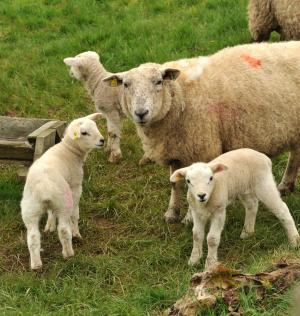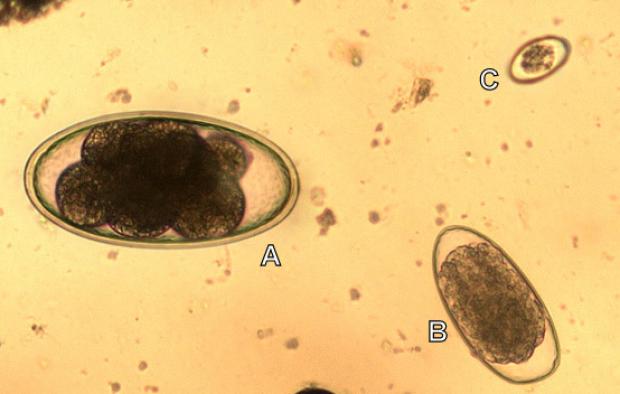AFBI Veterinary Sciences Division, wishes to advise sheep farmers of the likely risk of Nematodirus worm infection in young lambs, occurring at this time of the year.

Nematodirus infection results from the ingestion of large numbers of infective worm larvae present on contaminated pasture. Lambs grazing the same pasture in the previous year were the source of this contamination. For Nematodirus eggs to hatch they should experience a period of cold weather followed by warmer conditions. These conditions are usually achieved during the winter and spring of each year. Nematodirus eggs passed out by lambs in 2024 will generally have remained unhatched on the ground throughout the winter season. Given suitable conditions of moisture and temperature, they will undergo mass hatching in the spring of 2025, resulting in a high risk of infection for lambs. Affected lambs develop profuse scour and can die rapidly.
Using a forecasting system based on climate data, staff at the Institute have determined that hatching of Nematodirus eggs has already commenced, and that 10 % of the annual hatch would have occurred during the second week of March 2025. The current meteorological readings indicate that peak hatching would have taken place during the period from 25th March to 3rd April 2025.

Farmers should be aware that Nematodirus infection might be confused with coccidiosis, another disease which can cause severe scour in young lambs. As the treatments for Nematodirus infection and coccidiosis are different, accurate diagnosis and treatment recommendations, through your veterinary surgeon, are essential.
Nematodirus disease can be avoided or reduced in lambs by:
- not grazing lambs on the same fields as those grazed by lambs of a similar age last year.
- using anthelmintic drenches every 2 to 4 weeks. The interval between doses depends on the particular anthelmintic used and the severity of infection. To date, only limited evidence has been found of drug resistance in Nematodirus to any of the available classes of anthelmintic.
An added cause of concern for sheep farmers this year is the possibility that Haemonchus infection may be prevalent amongst growing lambs in the summer months. Last year, an unprecedented localised increase in Haemonchus infection in sheep was noted, likely linked to the mild wet climatic conditions. As a result, pasture in affected areas is likely to be contaminated by parasite eggs surviving from last season, and yearling animals are likely to be carrying hypobiotic larvae, which will be a source of infection for growing stock later in the season. Haemonchus infection causes profound anaemia in lambs, often with scour which may be blood-stained. Animals succumb rapidly, and numerous losses can occur in affected flocks.
Your veterinary surgeon should be consulted at an early stage. He or she is in an ideal position to provide advice on the prevention and /or treatment strategy best suited to your particular circumstances. AFBI’s Veterinary Sciences Division can test faeces samples from sheep or cattle to determine the level of worm eggs present. A minimum of 5 grams of faeces from each animal is required for this test. Any animals which die showing signs of bloody scour and/or anaemia should be submitted for post-mortem examination and testing for haemonchosis.
Notes to editors:
AFBI is an arms-length body of DAERA delivering research and development, diagnostic and analytical testing, emergency response capability and expert scientific advice for DAERA and other government departments, public bodies and commercial companies in Northern Ireland, and further afield.
AFBI’s Vision is “Scientific excellence delivering impactful and sustainable outcomes for society, economy and the natural environment”.
AFBI’s Purpose is to deliver trusted, independent research, statutory & surveillance science, and expert advice that addresses local and global challenges, informs government policy and industry decision making, and underpins a sustainable agri-food industry and the natural and marine environments.
AFBI’s strategic priorities:
- Leading improvements in the agri-food industry to enhance its sustainability;
- Protecting animal, plant and human health;
- Enhancing the natural and marine environment;
- Delivering quality outcomes and impact;
- Enabling world class science through excellence in people, places & technology.
Latest news
- AFBI issues Nematodirus warning – Spring 2025 11 April 2025
- Managing Nature Based Risks to the UK Economy and Opportunities for Green Finance 08 April 2025
- AFBI Hillsborough host AERA committee 27 March 2025
- The Omics Days Conference 27 March 2025
